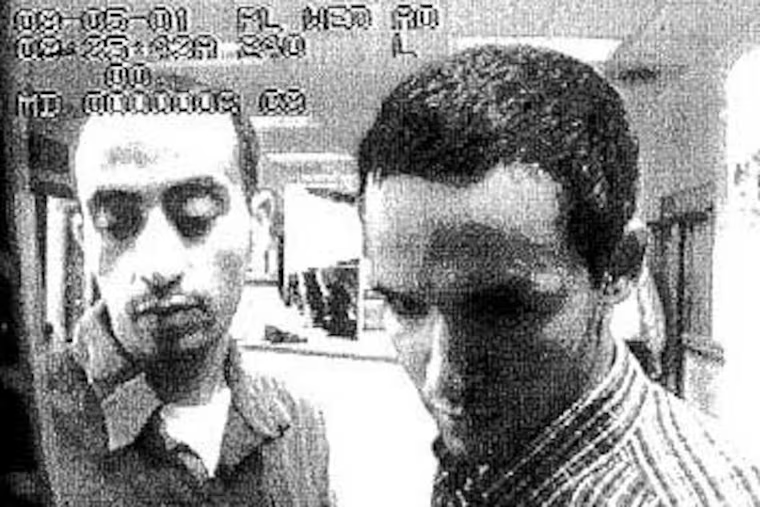Factcheck: 9/11 Hijackers and Student Visas

Independent government reports, including an April 2011 report by the Government Accountability Office, raise legitimate concerns about the need to better track those who overstay their visas. But student visas are just a small percentage of all non-immigrant visas, and incorrect claims about the 9/11 hijackers has put the focus on student visas. Some worry that focus feeds into negative stereotypes about foreign students as potential terrorists.
Supporters and critics alike of the Border Security, Economic Opportunity and Immigration Modernization Act of 2013 being considered in the Senate have made incorrect claims about the 9/11 hijackers having student visas.
Here's what Sen. Rand Paul, a critic of the legislation, said during a Senate Homeland Security and Governmental Affairs Committee hearing on the immigration bill:
Rep. Candice Miller echoed similar sentiments on Fox News on April 29:
Homeland Security Secretary Janet Napolitano and two Republican senators went even further during an April 23 Senate Judiciary Committee hearing on the immigration bill (accessed via Nexis).
Graham is a member of the so-called "Gang of Eight" that drafted the immigration bill, and Napolitano supports the legislation. Grassley does not.
Sen. Marco Rubio, another "Gang of Eight" member, also cited the 9/11 hijackers in an April 24 Fox News interview with Neil Cavuto while making a pitch for his legislation, which he said includes tighter controls on student visas.
The fact is, only one of the 19 9/11 hijackers came to the U.S. on a student visa, according to the 9/11 Commission Report. That one was Hani Hanjour, a Saudi Arabian terrorist who piloted the plane that was flown into the Pentagon, according to a 2004 staff report of the National Commission on Terrorist Attacks Upon the United States. In his student visa application, Hanjour provided paperwork showing that he was enrolled in an English as a second language program in Oakland, Calif., but he never attended after arriving in America (a fact that would draw scrutiny today). He did not, however, overstay his student visa.
Of the other 18 9/11 hijackers, 14 came to the United States on six-month tourist visas and four came on business visas, according to the National Commission on Terrorist Attacks Upon the United States. Once in the U.S., two of the hijack pilots applied to have their immigration status changed to vocational student, but neither used such a visa on their subsequent re-entry into the country.
So why does it matter if just one — as opposed to "some" or "all" – of the 9/11 hijackers came to the U.S. on a student visa? Vic Johnson, public policy director for NAFSA: Association of International Educators, told us that such misinformation feeds into the negative stereotype "that foreign students are terrorists or dangerous people."
NAFSA issued a press release a day after Napolitano's April 23 Senate testimony to correctly note that only one of the 9/11 hijackers entered the U.S. with a student visa. "Misstating the facts misleads the American public," the release said.
Such concerns have risen as critics of the immigration legislation cited student visas after the Boston Marathon bombing to urge Congress to move more slowly.
A day after the bombing — before the police publicly identified any suspects — Rep. Peter King speculated that the terrorist plot was carried out by someone with a student visa.
"Some of the speculation that has come out is that yes, it was a foreign national and, speculating here, that it was potentially a person on a student visa," King told National Review Online. "If that's the case, then we need to take a look at the big picture."
That turned out not to be the case. The two brothers accused of carrying out the bombing, Dzhokhar and Tamerlan Tsarnaev, immigrated to the United States in 2002 as refugees.
However, authorities later charged two of Dzhokhar Tsarnaev's friends with conspiracy to obstruct justice, alleging they disposed of items from the bombing suspect's dorm room. A criminal complaint filed against Dias Kadyrbayev and Azamat Tazhayakov said they both came here on student visas and were being held for violating their visas. According to the Christian Science Monitor, Tazhaykov was permitted to re-enter the country after the winter break even though his student visa had been revoked 16 days earlier because of poor grades. In the wake of that arrest, Fox News published a story on the "astonishing" problem of student visas.
But the entry/exit tracking system proposed in the Senate immigration bill seeks to better monitor the status of those who come to the U.S. on a visa, no matter what type of visa it is.
Johnson said he applauds congressional efforts to track visa holders, but he feels the focus has been put unduly on student visas, which accounted for nearly 6 percent of all visas in 2012. Those on student visas are already the most closely monitored, he said. In 2002, in wake of the 9/11 attacks, the Bush administration established the Student and Exchange Visitor Information System, or SEVIS.
Officials who infuse the 9/11 hijackers into the immigration debate and focus on student visas are confusing the issue, Johnson said. Again, only one of the hijackers came to the U.S. on a student visa. And while several of the other hijackers on tourist or business visas overstayed their visas, the hijacker who was in the U.S. on a student visa did not.
Factcheck.org is a nonpartisan, nonprofit "consumer advocate" for voters that aims to reduce the level of deception and confusion in U.S. politics.
Based in Philadelphia, Factcheck monitors the factual accuracy of what is said by major U.S. political players in the form of TV ads, debates, speeches, interviews and news releases. Our goal is to apply the best practices of both journalism and scholarship, and to increase public knowledge and understanding.